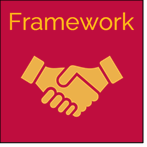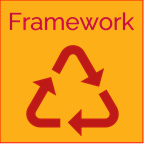Program Resources
Below are some examples of best practices, partnerships and templates to help support the success of your 21st CCLC grant.
The Annual Verification Checklist for 21st CCLC Site Leaders.
In order to ensure that all required 21st CCLC components/necessary documents are at hand should transition of positions at 21st CCLC Sites occur, an updated Annual Verification Checklist for 21st CCLC Site Leaders should completed at the end of each program year. The checklist is a fillable form which can be emailed electronically to your assigned Program Specialist if requested.
The Arizona 21st CCLC team has created frameworks to assist program leaders and their community to better understand key elements of successful 21st CCLC program implementation.
Click here or icon for Partnerships Framework
In accordance with Title IV, Part B, 21st CCLC of the Every Student Succeeds Act (ESSA), the Arizona Department of Education is required to provide a list of prescreened external organizations, as described under section 4203(a)(11). This list identifies organizations that have worked with other 21st CCLC programs in the state and may be available to provide services, resources, and technical assistance for your out of school time programs.
External Community Partners
21st CCLC External Non-Profit Community Partnership List (pdf)
We are a nonprofit organization that has worked with 21st CCLC programs in Arizona. How can we add our organization to the list?
Contact the 21st CCLC program leader who established a partnership with your nonprofit and request that they email the following information: 1. Nonprofit Name 2. Website 3. Phone Number 4. Targeted Areas - Academic, Youth Development, Family Engagement 5. Region of Arizona to: [email protected]
Partnership Resources
Are you looking for a home-grown AZ Community Partner?
The University of Arizona Cooperative Extension implements programming in every county in Arizona. Please visit the below links by county to learn how they support the mission of your 21st CCLC program in areas of academics, youth development, and family engagement.
LINKS BY COUNTY ALPHABETICALLY:
Cochise
Coconino
The Arizona 21st CCLC department strives to provide National, State, and Local resources to their grantees.
National Resources
1.AIR - American Institutes for Research AIR’s work in the afterschool and expanded learning field supports the creation, evaluation, improvement, and maintenance of high-quality afterschool and expanded learning programs in a variety of ways that includes research based methodologies.
2. Afterschool Alliance The Afterschool Alliance is a nonprofit organization dedicated to raising awareness of the importance of afterschool programs and advocating for quality, affordable programs for all children. It is supported by a group of public, private, and nonprofit organizations that share the Alliance's vision of ensuring that all children have access to afterschool programs.
3. Foundations Inc. Foundations' Center for Afterschool and Expanded Learning supports K-12 educators in making out-of-school time a dynamic time for learning and healthy development. Educators can readily apply our customized products, services, training and tools to improve their own expanded learning programs.
4. C. S. Mott Foundation The C.S. Mott Foundation is a partner of the U.S. Department of Education’s 21st Century Community Learning Centers initiative. The foundation is a private philanthropy that awards grants, in four program areas, in the United States and selected regions internationally.
5. Harvard Family Research Project (HFRP) The HFRP is part of Harvard’s Graduate School of Education. Their Out-of-School Time (OST) research area provides accessible information to support the accessibility, quality, and sustainability of out-of-school time programs and initiatives.
6. National After School Association A membership association for professionals who provide extended learning opportunities and care during out- of- school hours. NAA host a variety of events for the afterschool community to encourage networking, professional development and advocacy for the field. NAA offers a free membership providing resources to support developing afterschool professionals.
7. National Institute for Out-of-School Time (NIOST) Located at the Center for Research on Women at Wellesley College, NIOST studies issues and policy regarding children’s out-of-school time. Their website contains research and publications about quality management and curriculum for after-school programs. Making an Impact on Out-of-School Time is a new publication giving a comprehensive investigation to after-school care.
8. U.S. Department of Health and Human ServicesThe section on Family and Children Programs offers useful resources on health and safety.
9. U.S. Department of Education 21st Century Community Learning Centers (21st CCLC) The U.S. Department of Education, Office of Elementary & Secondary Education, has information related to the federal purpose, eligibility, applicant information, awards to each State, performance, funding status, laws, regulations & guidance, resources, FAQs, and contacts.
10. You for Youth (Y4Y) The federal 21st CCLC office has established a website to support our work- You for Youth. The You for Youth website offers Online Professional Development and Technical Assistance for 21st CCLC programs in the following categories:
- Project-Based Learning
- Aligning With The School Day
- Strengthening Partnerships
- Family Engagement
- Literacy
11. The Forum for Youth Investment - The Forum for Youth Investment provides products and services to help leaders improve partnerships, policies, and practices for young people. These products and services are based on best practices in youth development and on our experience working with hundreds of communities around the country since our founding in 1998.
12. What Works Clearinghouse - What Works Clearinghouse is a central and trusted source of scientific evidence on education program, products, practices and policies. They focus on high-quality research to answer the question: “What Works in Education?”
State Organizations
Arizona Center for Afterschool Excellence The Arizona Center for After-school Excellence is dedicated to the enhancement of child and youth development and educational achievement through quality after-school programming.
Please also see the many statewide and local organizations that partner with 21st CCLC programs in Arizona are found are found under the Community Partnerships Tab in the 21st CCLC External Non-Profit Community Partnership List.
Lights on Afterschool Resources
Lights on Afterschool This event is a celebration of the dedicated work communities have in supporting youth through quality afterschool programs. We encourage all 21st CCLC grantees to participate in this event to highlight to students, families, school and community leaders the importance of afterschool.
Planning Timeline and Checklist
Arizona Center for Afterschool Excellence- Lights On Afterschool
Mandatory funding statement and Arizona 21st CCLC logo is required in publications to acknowledge that programming is being funded and supported through federal 21st CCLC grants awarded by the Arizona Department of Education.
Click link below for these resources.
Logo and Written Language Vision Statement
Communication is a crucial component for successful 21st CCLC programs. Below are templates and tools to support programs with developing effective communication practices.
- Assess College and Career Readiness
- Communication Format Guidelines (Tool 31)
- Comprehensive Needs Assessment (CNA) & Integrated Action Plan
- Data Discussions (Tool 91)
- Example of Site Created Informational Form
- Example of District Scheduling Communication for Transportation
- Example of Program Communication (Powered by STEAM)
- Family Links Portfolio
- Homework Help Tool (Tool 80)
- Homework Log (Y4Y)
- Practitioner Tips (Y4Y)
- Shared Responsibility Worksheet for Program Leader and Principal (Tool 45)
- Strengthening Partnerships (Y4Y)
- Template for Communicating With School Staff (Tool 47)
- The 4 C’s to 21st Century Skills
- Transition Checklist for Incoming 21st CCLC Site Leaders
- Transition Checklist for Outgoing 21st CCLC Site Leaders
- Transition Checklist for Incoming 21st CCLC District Leaders
Each agency has addressed the capacity to fulfill the staffing requirements (including site coordinator, teachers, clerks, aides, etc.) of their grant within the original application. Below are tools and templates to support the site with their staffing requirements.
- Example of Site Coordinator Start-up List
- Example of Site PD Calendar
- Job Description for Program Staff (Tool 19)
- Sample Interview Questions (Tool 22)
- Sample Human Resources Packet
- Tracking Hours (Blank)
Below are templates and tools to support programs with developing effective practices for 21st CCLC program.
- 21st CCLC Startup Toolkit
- Awareness Activities (Y4Y)
- Classroom Observation
- Continuous Improvement Planner
- Effective Program Management (Word)
- Family Links Sign-in Sheet Template (Word)
- Follow-Up and Supervision Checklist (Y4Y)
- Homework Log (Y4Y)
- Intentional Program Design Diagram (Y4Y)
- Intentional Activity Design Planner (Y4Y)
- Literacy “I Can” Progression Ladders (Y4Y)
- Logic Model (Y4Y)
- Mapping Resources for Citizen Science Implementation (Y4Y)
- Participation Enrollment Confirmation to Family (Tool 9)
- Project Based Learning Diagram (Y4Y)
- Procedure Checklist (Tool 5)
- Program Activity SMART Goals (Y4Y)
- Program Schedule (Tool 13)
- Sample Activity Planner (Tool 71)
- Sample Enrollment Form (Tool 8)
- Sample Policies and Procedure Table of Contents (Tool 6)
- Self-Assessment of Effective Qualities (Tool 26)
- Student Data Folder
- Student Portfolio
- Youth Development Checklist (Tool 63)
21st CCLC programs were originally designed to build a sustainable model for future programming. This can include internal and external partnerships that will collaborate to provide youth in their community’s opportunities beyond the duration of the 21st CCLC grant funding.
The Arizona 21st CCLC team has created a framework to assist program leaders and their community to better understand academic policy, support and examples of successful programs.
Click here or icon for Sustainability Framework
The SPOTLIGHT and VIDEO VAULT pages of the 21st CCLC website share Arizona examples of sustainable programs.
Sustainability Resources
The Road to Sustainability by the Afterschool Alliance. http://www.afterschoolalliance.org/documents/Toolbox/RoadtoSustainability.pdf
4 Things Every Afterschool Program Should Know https://medium.com/upmetrics-data-for-good/4-things-every-afterschool-program-should-do-to-become-sustainable-f9a558a8594e
Funding and Sustaining- Prepare for the Future http://www.afterschoolalliance.org/funding.cfm
Creating Your Sustainability Plan (PDF)
The Arizona Department of Education is not responsible for controlling or guaranteeing the accuracy, relevance, timeliness, or completeness of this outside information. Further, the inclusion of information or a hyperlink or URL does not reflect the importance of the organization, nor is it intended to endorse any views expressed, or products or services offered.










